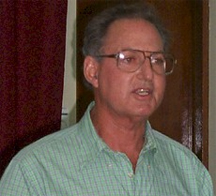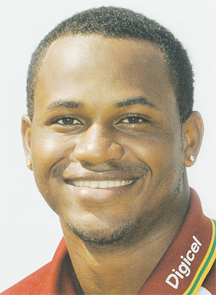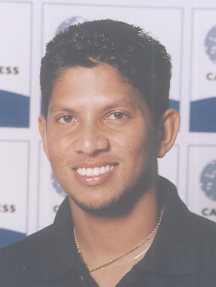By Tony cozier
Ramnaresh Sarwan would do well to follow the example of Marlon Samuels.
At his best, Sarwan is an experienced, proven, high quality batsman with a record of two doubles to go with 13 single hundreds in 87 Tests, along with 173 ODIs, and respective averages of 40 and 43. Of contemporary players, only Shivnarine Chanderpaul, by six years, and Samuels and Chris Gayle, by few months, have been around longer than Sarwan’s dozen years.

Yet, for a variety of reasons, he has not been chosen for the West Indies since he was dropped after mustering just 83 runs from eight innings in the home series against Pakistan and India in 2010.
Defamed by the West Indies Cricket Board and its then chief executive over his alleged disregard to fitness (to the extent of a US$166,000 legal judgment in his favour), denied a WICB contract in 2010 and omitted from last year’s tours of Bangladesh and India and the home series against Australia in March and April, a frustrated Sarwan committed himself to English county Leicestershire.
During the West Indies tour of England in May and June, he told a BBC interviewer that the coach said “some very negative stuff about me, things that were hurtful, hurt me mentally, emotionally.
“Mentally I was broken down, not from the stress of playing, it’s just certain individuals have drained me mentally,” he charged. “It took a toll on my confidence and the way I play. Everything went away.”
When asked if he would accept a call up by the West Indies team during the tour, Sarwan was adamant that he wouldn’t as he “owed Leicestershire because they’ve invested in me.
“When I was in the dust being kicked by my own people I was given an opportunity by this club and I will not forsake that or betray anyone,” he said. Contrast Sarwan’s response to such adversity to Samuels’.
Sarwan’s was not unexpected. He obviously abhors anyone in authority he perceives as disrespecting him and his fellow players.
He referred to the Australian, Bennett King, as “one of the worst coaches” he ever had. When captain Brian Lara advised him he was dropped on the morning of a Test in Pakistan in 2006, he said it made him aware that “sport is also about politics and that people do what’s necessary to accomplish their own goals, whatever they might be.”

Samuels had also endured several crises, different but no less potentially challenging than Sarwan’s.
As equally talented as Sarwan, he was also 19 when he made his Test debut (in Australia in January 2000 to Sarwan’s against Pakistan three months later). Yet he struggled to keep his place in the team. While Sarwan chalked up 83 Tests by 2010 (along with a brief period as captain), Samuels had only 29 with just two hundreds at a meager average of 28.73 .
According to the WICB, Sarwan’s eventual failing was fitness; Samuels, it said, was attitude, an accusation he says that always puzzled him.
When Samuels was suspended for two years by the International Cricket Council (ICC) for his dealings with an Indian bookmaker (he was debarred from all cricket, even for his Jamaican club Melbourne), the widely and not unfounded view was that such a laid-back underachiever would accept that his days with the West Indies were over and turn instead to Twenty20 franchise cricket or modeling or who knows what.
Instead, and unlike Sarwan, Samuels channelled the anger he felt at his seeming injustices into a steely determination not only to come back into international cricket but to make the most of his previously misused talent. He trained diligently, overworked the machines in the gym on a daily basis and had willing friends bowl at him in the nets. He knew that, because of his past, only performance would regain him his place.
In 2011, the first regional season after serving his ban, he was the leading scorer with 916 runs in 10 matches, 246 more than the next best. They were stats the selectors couldn’t ignore, although Samuels had to depend on an injury to Chanderpaul to be slotted in for the second home Test against Pakistan.

His runs didn’t flow right away. They came in dribs and drabs (the highest of four half-centuries in eight Test was 84) until an understanding WICB chief executive (two words rarely written in the same sentence) allowed him to miss the home series against Australia to take up an IPL contract with the Pune Warriors for half the season before joining the team on its England tour.
It was there that the trickle became a deluge. Years of pent-up talent suddenly blossomed into an overall average of 84.14 in five Tests there and at home against New Zealand. There was an ODI hundred against the Black Caps and that astonishing, match-winning 78 off 54 balls in the final of the World T20 in Colombo three Sundays back.
Now Samuels has announced it is his goal to become the No.1 batsman in the world.
It is not implausible but the point to consider for Sarwan and all those who are offended by the WICB – and the list is long – that it cannot be achieved by turning out for a Division 2 team in the English county championship or in the IPL, Australia’s Big Bash or any other such club league.
And they must also know, as Samuels showed, that the only road to redemption is through performance.
Sarwan has now written to chief selector Clyde Butts advising him that he is available for the West Indies and that such a return is not compromised by his contract with Leicestershire, extended during the season.
Butts and his colleagues can only be guided primarily by his present form, not simply by his potential or his past record. A modest season with Leicestershire, in which he averaged 40 (Brendan Nash, another one on the outside, averaged 47 for Kent) and his 29.75 in three matches for Guyana last season are hardly compelling arguments for his return.
There is no doubt that Sarwan at his finest would add to the strength of a West Indies team still searching for a reliable No.3, a crucial batting position in any team. He needs, as Samuels has done, to put his despair behind him and reawaken his former glory.
A target of becoming the best batsman in the world would also be helpful. At 19, it looked entirely possible that both he and Samuels had it in them to become just that. At 32, it’s not too late for either.





